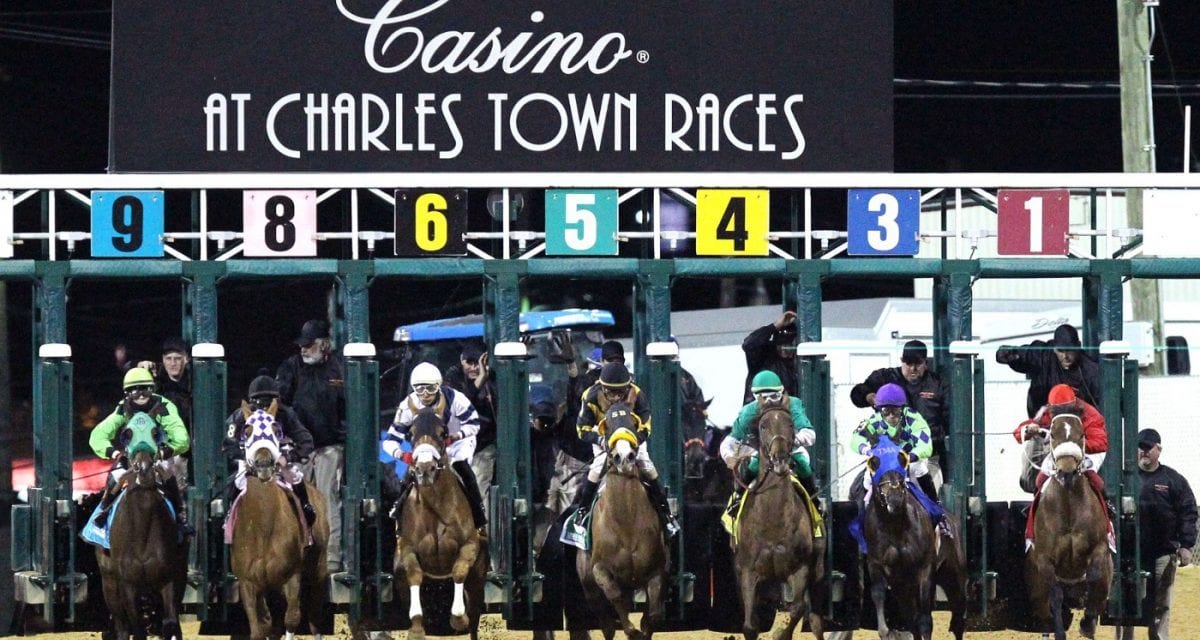(Photo by Coady Photography.)
by Tom LaMarra, courtesy of The Blood-Horse
Pro-racing lawmakers in West Virginia took part in a March 1 Capitol press conference designed to discuss the economic impact of Thoroughbred racing and breeding in the state given legislation that would decouple live racing from gaming.
Greyhound racing at two tracks has been the primary target, but a bill recently introduced in the House of Delegates would decouple—remove requirements that tracks have live racing to keep their gaming licenses—Thoroughbred racing as well. Purses for horse and dog racing in West Virginia are supplemented with revenue from video lottery terminals and table games.
Florida racing interests are currently in the midst of a similar battle against decoupling.
“The mere threat of passing legislation which would decouple racing from casino operations in West Virginia creates tremendous instability in the Thoroughbred breeding and racing industry in our state,” said Del. Paul Espinosa, who represents Jefferson County, where Hollywood Casino at Charles Town Races is located. “Thoroughbred breeders have choices where they conduct their operations and West Virginia has been a desirable place for them to do business, but the current atmosphere of uncertainty has breeders looking elsewhere.”
West Virginia breeders have said they feel “bombarded all sides.”
The area around Charles Town is the hub of Thoroughbred breeding in the state. According to industry estimates, about 5,300 people are employed in horse racing in Jefferson County and Hancock County, where Mountaineer Casino, Racetrack & Resort is located.
Sen. Herb Snyder, who also represents Jefferson County, said casino gambling at tracks was based upon approval by voters in county referendums, and that the Racetrack Video Lottery Act stated a key objective was to preserve live racing and breeding and protect green space.
“This was achieved through the dedication of a portion of racetrack video lottery revenue to purse and breeders’ funds,” Snyder said. “This is what the voters in Jefferson County understood when they voted to authorize racetrack video lottery at Charles Town Races. Now, those principles are being threatened and thousands of West Virginia jobs, as well as millions of dollars in local and state tax revenue, hang in the balance.”
The Charles Town Horsemen’s Benevolent and Protective Association and Mountaineer HBPA were instrumental in the introduction of a bill that restore some of purse funds taken away to pay down debt in the state workers’ compensation program. The diversion of funds began in the mid-2000s and was scheduled to sunset this year, but the money will instead be subject to legislative appropriation.
“The Thoroughbred racing industry in West Virginia has been a part of solutions to help the state budget and pay down debt,” said Joe Funkhouser, a Charles Town HBPA board member who is running for the state Senate this year. “Our industry took a permanent 10% reduction in the breeder and purse fund in 2014. We also accepted supplementary charges to help pay down the long-term debt (for workers’ comp).
“While other industries have participated in this supplementary charge, those industries will be relieved of this debt once the old fund is paid off later this year. Unfortunately, the Thoroughbred industry has been left out of receiving that relief.”
When the debt-reduction program began, about $11 million a year for horse and dog racing purses was diverted from purse accounts.
Del. Jill Upson, who also represents Jefferson County, said the industry goes beyond purse supplements. She mentioned breeders, trainers, exercise riders, stable hands, jockeys, grooms, veterinarians, farmers, farm supply and equipment stores, banks, retail establishments, automobile dealers, restaurants, hotels, and convenience stores that all rely on horse racing for income.
Mountaineer HBPA executive director Jana Tetrault also said various businesses in Hancock County are dependent upon racing at Mountaineer, which no longer races year-round because of continued declines in revenue for purses.
Story courtesy of The Blood-Horse. In order to provide our readers more complete coverage of the Thoroughbred industry, The Racing Biz and The Blood-Horse have crafted a content-sharing agreement allowing each the ability to post stories originally published by the other.









